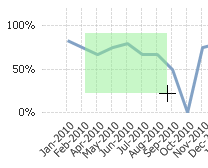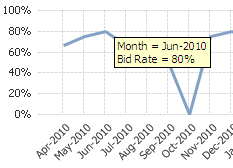Bid Rate Trended Chart
|
Chart Item
|
Description
|
|
Horizontal axis: calendar months, quarters, or years
|
The horizontal axis displays the range of calendar months, quarters, or years included in the bid rate analysis period. You can use the Cycle button ( ) to cycle through the three analysis period options. ) to cycle through the three analysis period options.
|
|
Vertical axis: bid rate
|
The vertical axis displays the bid rate range (0 – 100 percent).
|
|
Chart line: bid rate by month, quarter, or year
|
Each intersection of the chart line with the grid line for a time segment represents the bid rate for opportunities that have a bid rate analysis date within that month, quarter, or year.
|
|
Data Item
|
Description
|
|
Bid rate for a period
|
Number of bid opportunities ÷ (Number of bid opportunities + Number of no-bid opportunities)
Or
Pipeline amount for bid opportunities ÷ (Pipeline amount for bid opportunities + Pipeline amount for no-bid opportunities)
The calculation used depends on whether you select Count or Amount in Display Trended Rates Based On.
The rate is displayed as a percentage.
|
For descriptions of the sources of the chart data, see Data Sources.
Your firm uses the opportunity open date as the bid rate analysis date. The total pipeline amounts for the bid opportunities and no-bid opportunities with an open date in November 2012 are the following:
-
Bid opportunities: $2,000,000
-
No-bid opportunities: $3,000,000
When you select Amount in Display Trended Rates Based On, Capture Analytics displays a 40% bid rate for November 2012:
2,000,000 ÷ (2,000,000 + 3,000,000) = .4 = 40%
As part of the Costpoint Analytics configuration
process, your system administrator specifies the date field from opportunity
records in GovWin Capture Management that Costpoint Analytics uses to
build the calendar for the bid rate portion of the Bid and Win Rate Analytics.
That calendar is used to determine which opportunities to include in the
bid rate calculations when you use the calendar bar to select an analysis
period.
For example, your firm could use the opportunity
open date. When you select a year in the calendar bar above the Bid Rate
Trended chart to specify an analysis period for bid rates, Costpoint Analytics
includes all bid and no-bid opportunities with an open date that falls
within that year.
The bid rate analysis date field can be, and often
is, different than the win rate analysis date field. If the two date fields
are the same, however, the analysis period you select for the bid rate
analytics is automatically applied to the win rate analytics as well.
As part of the Costpoint Analytics configuration process, your system
administrator specifies how Costpoint Analytics is to determine which
opportunities are bid and no-bid opportunities for the purpose of calculating
your firm's bid rates. That determination can be based on stage, on a
user-defined field from the Opportunity table in GovWin Capture Management,
or on a combination of the two.
For more information, see Bid
and Win Rate Settings.
When your firm implements Capture Analytics, it can select two amount fields from opportunity records in GovWin Capture Management to analyze as pipeline. The options under Pipeline Amount enable you to display bid rates calculated using amounts from either of those two fields. If you select Amount in Display Trended Rates Based On, Capture Analytics displays bid rates for the Bid Rate Trended chart based on amounts from the selected field.
Pipeline amounts used to calculate bid rates are unweighted amounts.
Click  at the top right of the chart
to display the chart at its maximum size. Click
at the top right of the chart
to display the chart at its maximum size. Click  to restore the chart to its original size and location on the tab.
to restore the chart to its original size and location on the tab.
To focus the chart on a particular set of data points, click and drag the mouse pointer over the chart so that the green selection area touches only the data points you want to include.  Illustration
Illustration
To focus the chart on a more restricted analysis period, do either of the following:
-
Specify the analysis period using the year options above the chart.  Illustration
Illustration
-
Click and drag the mouse pointer over the data points in the chart so that the green selection area touches only the data points for the months, quarters, or years you want.  Illustration
Illustration
It is much easier to make selections on the chart itself if you first maximize the chart.
If you use any of the above actions to change the chart, Capture Analytics applies the same changes, as appropriate, to other analytic objects.
Use the Cycle button ( ) to select any of the three analysis period options for the horizontal axis: Month, Quarter, and Year:
) to select any of the three analysis period options for the horizontal axis: Month, Quarter, and Year:
To see the bid rate data for a specific data point, position the mouse pointer over the intersection of the chart line and the grid line for the time segment. When you do, Capture Analytics displays the month, quarter, or year and the bid rate.  Illustration
Illustration
It is much easier to position the mouse pointer over a data point if you first maximize the chart.
Click  to send the data underlying
the chart to Microsoft Excel. More...
to send the data underlying
the chart to Microsoft Excel. More...
![]() ) to cycle through the three analysis period options.
) to cycle through the three analysis period options.
